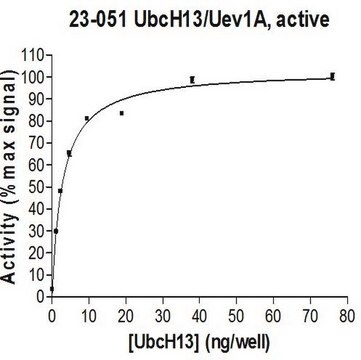U2383
Ubiquitin Carrier Protein H3/CDC34 human
≥95% (SDS-PAGE), recombinant, expressed in E. coli overproducing strain
Sign Into View Organizational & Contract Pricing
All Photos(1)
About This Item
Recommended Products
biological source
human
Quality Level
recombinant
expressed in E. coli overproducing strain
Assay
≥95% (SDS-PAGE)
form
solution
mol wt
~32 kDa
application(s)
cell analysis
shipped in
dry ice
storage temp.
−70°C
Gene Information
human ... CDC34(997) , UBE2N(7334)
Biochem/physiol Actions
Cdc34 is an essential gene for viability in yeast. Cdc34 mediates the transition from G1 to S-phase of the cell cycle by degrading the S-phase cyclin/CDK inhibitor, SIC1 in yeast and p27(KIP1) in human. Cdc34 is also known to interact with the Skp1/Cdc53/F-box (SCF) ubiquitin ligase subunits Cul1 to degrade the NF-κB inhibitor IκBα in a phosphorylation-dependent manner.
Infected cell protein 0 of herpes simplex virus 1 was shown to bind UbcH3 and induce its degradation by promoting its polyubiquination. This resulted in increased expression of an UbcH3-target gene cyclin D1 and aided in further viral infection.
Physical form
Solution in 50 mM HEPES, 200 mM NaCl, 1 mM TCEP (pH 7.5), and 10% glycerol.
Other Notes
Manufactured for Sigma by Boston Biochem. Inc.
Storage Class Code
12 - Non Combustible Liquids
WGK
WGK 1
Flash Point(F)
Not applicable
Flash Point(C)
Not applicable
Certificates of Analysis (COA)
Search for Certificates of Analysis (COA) by entering the products Lot/Batch Number. Lot and Batch Numbers can be found on a product’s label following the words ‘Lot’ or ‘Batch’.
Already Own This Product?
Find documentation for the products that you have recently purchased in the Document Library.
Ryan Hagglund et al.
Proceedings of the National Academy of Sciences of the United States of America, 99(2), 631-636 (2002-01-24)
Infected cell protein 0 (ICP0) of herpes simplex virus 1, a multifunctional ring finger protein, enhances the expression of genes introduced into cells by infection or transfection, interacts with numerous cellular and viral proteins, and is associated with the degradation
Evangelia Koutelou et al.
The Journal of biological chemistry, 283(7), 3846-3853 (2007-12-14)
Notch signaling constitutes an evolutionarily conserved mechanism that mediates cell-cell interactions in various developmental processes. Numerous regulatory proteins interact with the Notch receptor and its ligands and control signaling at multiple levels. Ubiquitination and endocytosis followed by endosomal sorting of
Our team of scientists has experience in all areas of research including Life Science, Material Science, Chemical Synthesis, Chromatography, Analytical and many others.
Contact Technical Service







